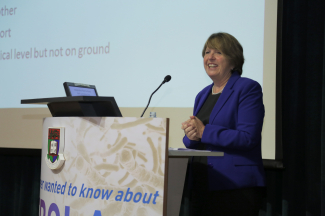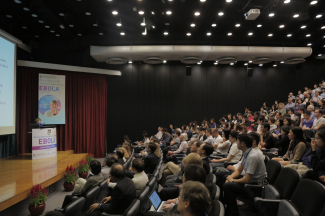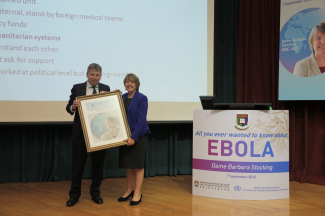Media
WHO Collaborating Centre for Infectious Disease Epidemiology and Control hosts lecture by Dame Barbara Stocking on “All you ever wanted to know about Ebola”
07 Sep 2015
The WHO Collaborating Centre for Infectious Disease Epidemiology and Control under the School of Public Health, Li Ka Shing Faculty of Medicine, The University of Hong Kong (HKU) hosted an academic lecture entitled "All you ever wanted to know about Ebola" by Dame Barbara Stocking today (September 7). More than 250 colleagues and students including the President and Vice-Chancellor, Professor Peter Mathieson, and leading experts of the medical sector had attended the lecture, which was a full house event.
Professor Gabriel M Leung, Co-Director of the WHO Collaborating Centre for Infectious Disease Epidemiology and Control, Dean of Medicine and Chair Professor of Public Health Medicine at the University of Hong Kong, welcomed audience to the lecture and said, “HKU School of Public Health has been at the forefront of research in emerging infectious diseases and we look forward to contributing further to the work of the WHO in the control and prevention of communicable diseases and in enhancing global public health.” Professor Leung also extended his thanks to Dame Barbara Stocking for giving this lecture and taking part in the panel discussion on Ebola for the University’s first MOOC “Epidemics”, which will be offered for the second time starting on September 15, 2015.
Dame Barbara served as the Chief Executive of Oxfam GB for thirteen years (2001-2013) and before that, as Regional Director of the National Health Service, UK and Founding Director of the NHS Modernisations Agency (1993-2001). Dame Barbara is currently the President of Murray Edwards College, The University of Cambridge. In March 2015, Dame Barbara was appointed Chair of the Independent Panel to assess WHO’s response in the Ebola outbreak; the Final Report of the Panel was released in July 2015.
At the lecture, Dame Barbara shared her observations during her visits to the Republic of Guinea and Brazzaville, the Republic of the Congo, two of the most heavily affected countries during the recent Ebola outbreak. “These poor countries suffered from inadequate health systems with very poor surveillance of disease outbreaks. In order to bring the epidemics under control, it is essential to have committed government, good leadership, excellent technical work with close monitoring following patient treatment, and changing behaviours in community,” said Dame Barbara. Dame Barbara also warned that the crisis is not yet over in some regions of West Africa, especially in Guinea. As regards the findings of the Final Report of the Independent Panel, Dame Barbara addressed that the Panel’s recommendations are classified into 3 areas: (1) the International Health Regulations, (2) WHO’s health emergency response capacity and (3) WHO’s role and cooperation with the wider health and humanitarian systems. Specifically, the Panel has suggested the idea of establishing an intermediate level of alert to sound an alarm earlier than a full Public Health Emergency of International Concern, the need for a unified programme for health emergencies across the 3 levels of WHO, and better integration and coordination between health and humanitarian systems.
About Epidemics MOOC
The University of Hong Kong has been working on a series of MOOCs (Massive Open Online Courses) named “HKUx” since joining edX, the non-profit online education platform founded by the Massachusetts Institute of Technology (MIT) and Harvard University. The first course on the HKUx platform is “Epidemics”, which was first launched in September 2014 and is now enrolling students for its second intake to commence on September 15, 2015 . This free online course explores the science, prevention and control of epidemics.
The course is led by Professor Gabriel M Leung, Dean of the Li Ka Shing Faculty of Medicine, HKU, and eight world-renowned experts on infectious diseases and public health. In addition to lectures by leading scientists in this field from HKU, this course will feature panel discussions with world leading experts in epidemics, including Professor Peter Piot who is the co-discoverer of Ebola Virus and Dame Barbara Stocking who chairs the 2015 WHO-commissioned panel that assesses WHO's response to the Ebola outbreak.
About WHO Collaborating Centres
WHO CC are institutions such as research institutes, parts of universities or academies, or governmental bodies which are designated by the Director-General to carry out activities in support of the Organization's programmes. Currently there are over 700 WHO collaborating centres in over 80 Member States working with WHO on areas such as nursing, occupational health, communicable diseases, nutrition, mental health, chronic diseases and health technologies.
About the School of Public Health, Li Ka Shing Faculty of Medicine, HKU
The School of Public Health, Li Ka Shing Faculty of Medicine, HKU has a long and distinguished history in public health education and high impact research. With world leading research in infectious diseases as well as on non-communicable diseases of both local and global importance, the School has made significant contributions through its research and advocacy to improve the health of populations and individuals, both locally and globally. The School is a leading research and teaching hub in public health on influenza and other emerging viruses, control of infectious and non-communicable diseases, tobacco control, air pollution, psycho-oncology, behavioral sciences, life-course epidemiology, and health economics, health services planning and management. This work has informed international (e.g. the World Health Organization, Food and Agriculture Organisation of the United Nations), national and local public health policies.
Please visit the website at http://www.med.hku.hk/v1/news-and-events/press-releases for press photos.



